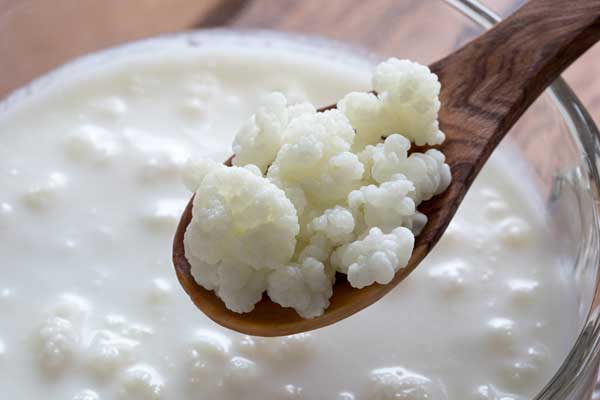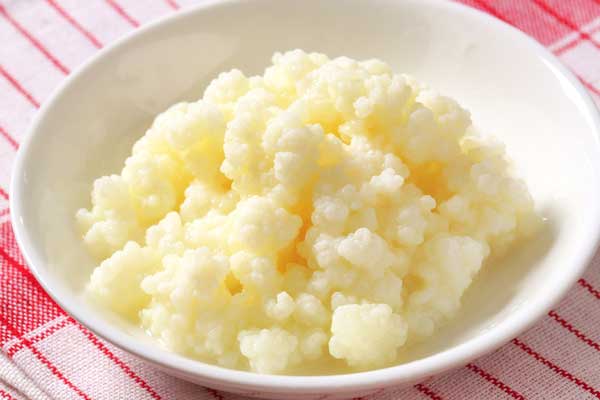If you’re a fan of plain yogurt, then you’ll probably be a fan of kefir. This fermented foodstuff dates back centuries and is packed full of probiotics that make for better gut health. From its history to the many benefits and how to use it, here’s the skinny on kefir.

The Origins of Kefir
There are various myths surrounding the origin of kefir, including one that suggests the Prophet Mohammed gave kefir grains, the bacteria cultures that ferment milk into kefir, with magical powers to Tibetan monks or possibly even Orthodox Christians. These recipients were given strict dictates not to share the grains with others, lest they lose their magical powers. In a nod to this piece of folk history, common alternate names for kefir grains and kefir, respectively, are “Grains of the Prophet Mohammed” and “Drink of the Prophet.”
Understandably, this legend isn’t widely accepted as fact. It’s more likely that kefir originated when shepherds in the Caucasus Mountains mistakenly fermented milk in their leather pouches, turning it into this beverage. And only with more time and history did the shepherds start to uncover the significant health benefits associated with the drink, and rumors of its “magical powers” spread to nearby Russia, Asia, and more recently, Western Europe and the United States.
The Science Behind Kefir
Kefir is a unique fermented dairy product that comes from grains made up of active bacteria and yeast. These grains, primarily kefiran, contain bacteria and yeasts that feed on milk and look a little bit like gelatinous cottage cheese. Kefir is the only fermented dairy product known to come from grains. Because these kefir grains are made up of active bacteria and yeast, they’re essentially a living organism.
The Fermentation Process
Depending on where you get your grains and how they’re being used, the makeup of the microorganisms in the grains and kefir can change. The actual fermentation is simple. The grains go in a bottle or container of milk for about a day to “feed,” fermenting the milk and creating kefir. While milk kefir is the more popular kefir drink, water kefir is also an option. But you can’t simply place the milk kefir grains in water and end up with water kefir. You need different grains.
Probiotics and Gut Health
According to Cleveland Clinic, probiotics are the beneficial bacteria and yeasts that live inside the body. It’s completely normal and healthy to have bacteria living inside your gut to help combat bad bacteria and support healthy immune function. While everyone has probiotics living inside their bodies naturally, illness, stress, an unbalanced diet, and taking antibiotics can all affect the body’s microbiome, and in some instances, wipe out healthy bacteria.
Consuming probiotics in your diet can help restore a healthy microbiome and support overall health. Kefir is packed with probiotics, having the most probiotics of any naturally fermented food, with between 30 and 50 strains of bacteria. It can help repopulate the gut’s good bacteria rather than simply passing through the digestive system.
Comparing Kefir to Yogurt
Even though the composition of kefir can change from batch to batch, or adapt to different environments, the vast number of bacteria and yeasts found in milk kefir is impressive. It even has a leg up on yogurt. According to an article on Healthline, kefir grains contain up to 61 strains of bacteria and yeast. This is far more bacteria than other fermented dairy products, and some fermented dairy products, including yogurt, don’t contain any strains of yeast.
Nutritional Value
Milk kefir isn’t just full of gut-healthy probiotics, it’s packed full of nutrition, too. Generally speaking, milk kefir is made from whole milk. As such, the nutrition content you typically find in milk is also found in kefir. A 6-ounce serving of kefir delivers between 3-6 grams of fat, depending on the type of milk used, along with 6 grams of protein, 7-8 grams of carbohydrates, 20 percent of the recommended dietary allowance for both calcium and phosphorus. In that same serving, you’ll also find 14 percent of the recommended allowance for vitamin B12, 19 percent of the recommended amount of riboflavin, 5 percent of the recommended amount of magnesium, and small amounts of vitamin D, K2, organic acids, and peptides. Of course, nutrient profiles can vary somewhat depending on the fat content of the milk you use.
Kefir for Lactose Intolerance
According to Healthline, it’s estimated that roughly 75 percent of the world’s population experiences digestive discomfort after consuming dairy products. This discomfort is called “lactose intolerance” and refers to a person’s inability to digest the sugar commonly found in dairy foods. It’s a real bummer for people who have a penchant for cheese and ice cream, but end up suffering the consequences if they choose to indulge. However, there’s some good news for dairy lovers when lactose doesn’t love them back. According to a study published in the Journal of the American Dietetic Association in 2003, consuming kefir may improve lactose digestion and tolerance.
Kefir During Pregnancy
As beautiful as it is to bring a new life into the world, anyone who has been pregnant knows that there are some unfortunate side effects that rear their heads during pregnancy. And as unfortunate as it is, many of those symptoms are gastrointestinal in nature. According to Lifespan, some of the most common gastrointestinal symptoms that pregnant women face are diarrhea, constipation, and in some cases, Irritable Bowel Syndrome. Because probiotics are helpful in addressing gastrointestinal problems, according to the American Pregnancy Association, many pregnant women take a probiotic supplement during pregnancy. The good news is, a study published in Canadian Family Physicians in 2011 found that probiotics are considered safe for use during pregnancy. That said, there’s no reason pregnant women can’t look to bolster gut health naturally by consuming probiotic-rich foods, and kefir is a good choice because it can colonize in the intestines and improve gut health with time.
Kefir for Strong Bones
Strong bones are essential for maintaining overall health with age. Individuals who experience bone loss are more likely to experience fractures, which can significantly impact a person’s quality of life and can even lead to an early death. In fact, a 2010 study published in the Geriatric Orthopaedic Surgery & Rehabilitation journal found that while the relative risk of mortality in elderly individuals increases 4 percent per year, those who suffer a hip fracture see a substantial risk of 1-year mortality. Specifically, the year after sustaining a hip fracture was linked to a 14 to 58 percent increase in the likelihood of death. That seems like a pretty good reason to bolster bone strength when you’re young, right? According to an article on Healthline, kefir appears to be a good way to increase calcium intake to meet recommended daily allowances. Plus, kefir contains vitamin K2 in addition to calcium, which helps enhance calcium metabolism and can help reduce the risk of fractures.

Kefir and Asthma Relief
One truly surprising benefit of kefir is that it may help reduce the symptoms of allergies or asthma. While studies to this effect are still limited, and mostly focused on animals rather than humans, there’s some evidence that kefir can suppress airway inflammation associated with asthma. In a 2007 study published in Immunobiology, researchers administered kefir to mice an hour before inducing airway inflammation that would mimic asthma symptoms. For mice that were given kefir, the increase in inflammatory cell count was significantly inhibited, leading researchers to note: “Kefir displayed anti-inflammatory and anti-allergic effects… and may possess new therapeutic potential for the treatment of allergic bronchial asthma.” But to be clear, this study was performed on mice, not humans, so please don’t go replacing your inhaler with a cup of kefir. That said, if you’re looking for a natural way to support your other asthma and allergy symptoms, kefir may be able to help you out, and in all likelihood, it won’t hurt you.
Making and Using Kefir at Home
While you can always grab a bottle of pre-made kefir off your grocery store shelf, kefir is surprisingly easy to make at home. Really, the only ingredients you need to make it are kefir grains and milk. You can ask a friend who makes kefir to “grow extra grains” for you, or you can purchase dehydrated grains from an online retailer. Once you have your milk and kefir grains, it’s really just a matter of mixing the two and allowing the fermentation to do its thing. Cultures for Health notes that you need a clean glass jar, a breathable cover for the jar, like a coffee filter or paper towel, and something to secure the cover to the jar like a large rubber band. Then, you simply place the grains in the jar and add milk, securely covering the jar with your preferred cover. The jar can be placed on your counter, allowing the milk to ferment for about 24 hours. Once the kefir is fermented, stir the mixture with a non-metal spoon and transfer the kefir to a separate glass container, using a strainer to remove the kefir grains.
Incorporating Kefir into Your Diet
The beauty of kefir, beyond its health benefits, is that it’s easily incorporated into recipes in place of milk or yogurt. One obvious place to use kefir is in smoothies. You can simply use the liquid in place of water, milk, or yogurt, enhancing your daily probiotic intake when you make the switch. Though sites like Buttered Side Up offer up recipes for indulgences like a strawberry cheesecake smoothie, you don’t need a fancy recipe — just throw blueberries, a banana, a handful of spinach and some kefir into your blender and whip up a tasty, nutrient-packed breakfast in minutes. But smoothies aren’t the only way you can put kefir to use. According to Kefir 101, you can incorporate kefir into bread, cultured vegetables, or even guacamole. And Health Food Lover offers more than 80 ways you can use milk kefir in your cooking, offering ideas like kefir-based pizza dough and kefir-infused cakes. And if you ever run out of ideas, Pinterest is your best friend. You’re unlikely to run out of ways to use kefir while scrolling through other people’s blog posts about it.
Conclusion
In conclusion, kefir is a versatile and nutritious superfood that offers a wide range of health benefits. From its origins in ancient folklore to its modern-day use as a probiotic powerhouse, kefir has proven its worth in promoting gut health, aiding lactose digestion, strengthening bones, and potentially alleviating asthma symptoms. Whether you buy it or make it at home, incorporating kefir into your diet can be a delicious and beneficial choice for overall well-being. So why not give it a try and unlock the potential of kefir for a healthier you?
